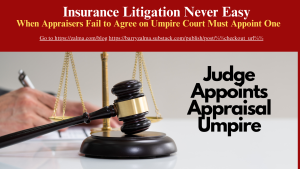Insurance Litigation Never Easy

See the full video at https://rumble.com/v4124us-insurance-litigation-never-easy.html and at https://youtu.be/B51ilfy6dLk
Post 4789
When a claim for damages due to a hurricane was disputed the parties demanded appraisal and appointed their respective appraisers. However, the appraisers could not agree on an umpire for reasons unclear and bad faith litigation ensured. Because of the inability of the appraisers to agree on an umpire the parties went to the District Court to appoint an umpire so the appraisal process can proceed.
In DORIAN THEODORE v. ALLIED TRUST INSURANCE COMPANY, Civil Action No. 22-951-SDD-RLB, United States District Court, M.D. Louisiana (October 18, 2023) the parties moved the USDC in Louisiana to appoint an Appraisal Umpire. The parties submitted separate lists of proposed umpires and their respective CVs for the Court’s consideration.
Background
The lawsuit involves claims for damage to property located in Gonzales, Louisiana as a result of Hurricane Ida. Dorian Theodore (“Plaintiff”) sought coverage and statutory bad faith damages related to claims made under an insurance policy (the “Policy”) issued by Allied Trust Insurance Company (“Defendant”).
The parties represent that the Policy provides the following language with respect to appraisals, including the appointment of an umpire:
Appraisal
If you and we fail to agree on the amount of loss, either may demand an appraisal of the loss. In this event, each party will choose a competent and impartial appraiser within 20 days after receiving a written request from the other. The two appraisers will choose an umpire. If they cannot agree upon an umpire within 15 days, you or we may request that the choice be made by a judge of a court of record in the state where the “residence premises” is located. The appraisers will separately set the amount of loss. If the appraisers submit a written report of an agreement to us, the amount agreed upon will be the amount of loss. If they fail to agree, they will submit their differences to the umpire. Any outcome of the appraisal will not be binding on either party.
Each party will:
1. Pay its own appraiser; and
2. Bear the other expenses of the appraisal and umpire equally.
Prior to the filing of this lawsuit, the parties selected their initial appraisers when Defendant demanded an appraisal of the loss. Plaintiff designated Matthew Addison as Plaintiff’s appraiser, and Defendant designated Ronald West as its appraiser. After the filing of this lawsuit, Plaintiff designated Mike Deckelman as Plaintiff’s appraiser. The parties’ appraisers were unsuccessful in jointly selecting an umpire in accordance with the Policy.
As ordered, the parties submitted separate lists of proposed umpires for potential appointment.
Law and Analysis
There is no dispute between the parties that the appraisal provision in the Policy is enforceable. The parties have jointly sought court appointment of an umpire in accordance with the appraisal provision in the Policy.
The District Court appointed Cade Cole as the appraisal umpire for the purposes of the instant insurance claim dispute. Federal courts routinely have appointed Cade Cole as deputy special master and recognized him as a “neutral” in Hurricane Laura and Hurricane Delta cases. The Court took judicial notice of this fact and found that Mr. Cole is well-qualified for the position of umpire and so selects him to fulfill that role in this case.
If Mr. Cole declines to serve as umpire in this matter, then the Court selects Joel Moore as umpire. His resume demonstrates that he is well-qualified for the position and would likewise serve as a neutral umpire.
As discussed above, although both Mr. Cole and Mr. Moore were proposed by the Plaintiff, the Court has no reason to suggest that both can fulfill this role in a fair, neutral and impartial manner.
Insurance claims resulting from hurricanes that have struck Louisiana have become aggressive, unfair and unreasonable. For two appraisers to fail to pick an umpire is an indication of litigation game playing forcing the District Court to appoint an umpire. This litigation requiring a judge to do what insurance appraisers do every day with little or no discussion reflects a desire to make the process more expensive and difficult rather than fulfill its purpose to quickly and fairly resolve the quantum of a loss.
 (c) 2023 Barry Zalma & ClaimSchool, Inc.
(c) 2023 Barry Zalma & ClaimSchool, Inc.
Please tell your friends and colleagues about this blog and the videos and let them subscribe to the blog and the videos.
Subscribe to my substack at https://barryzalma.substack.com/publish/post/107007808
Go to Newsbreak.com https://www.newsbreak.com/@c/1653419?s=01
Follow me on LinkedIn: www.linkedin.com/comm/mynetwork/discovery-see-all?usecase=PEOPLE_FOLLOWS&followMember=barry-zalma-esq-cfe-a6b5257
Daily articles are published at https://zalma.substack.com. Go to the podcast Zalma On Insurance at https://podcasters.spotify.com/pod/show/barry-zalma/support; Go to Barry Zalma videos at Rumble.com at https://rumble.com/c/c-262921; Go to Barry Zalma on YouTube- https://www.youtube.com/channel/UCysiZklEtxZsSF9DfC0Expg; Go to the Insurance Claims Library – http://zalma.com/blog/insurance-claims-library.
Like this:
Loading…
Related
About Barry Zalma
An insurance coverage and claims handling author, consultant and expert witness with more than 48 years of practical and court room experience.







